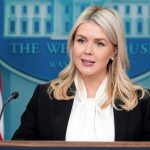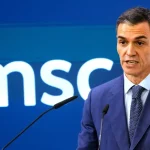President Joe Biden on Monday defended his foreign policy record and said he’s giving the incoming Trump administration a stronger hand to play on the world stage.
Speaking at the State Department in his final week as commander in chief, Biden said the United States has more friends and stronger alliances as he leaves office. He urged President-elect Donald Trump to carry forward his legacy, especially on climate agreements and U.S. global leadership.
On his deadliest foreign policy mistake — the chaotic withdrawal from Afghanistan that killed 13 service members — Biden stood by his decision to end the war that started after the Sept. 11, 2001, terrorist attacks.
“I’m the first president in decades to not leave the war in Afghanistan to his successor,” Biden said during his farewell address to State Department employees in Washington, D.C.
In an apparent attempt to acknowledge the cost of his Afghanistan decision, Biden searched his jacket pocket for a card he carries with “the actual number of dead and wounded incurred in our longest war” to remind himself of the bloodshed.
However, he could not find the card, apologizing, “I think I have my schedule with me, and I keep — I don’t actually.”
“We grieve those brave service members whose lives were lost in the withdrawal,” Biden said, moving on to list the ways resources previously used in Afghanistan can now be put to better use elsewhere. “Ending the war was the right thing to do, and I believe history will reflect that.”
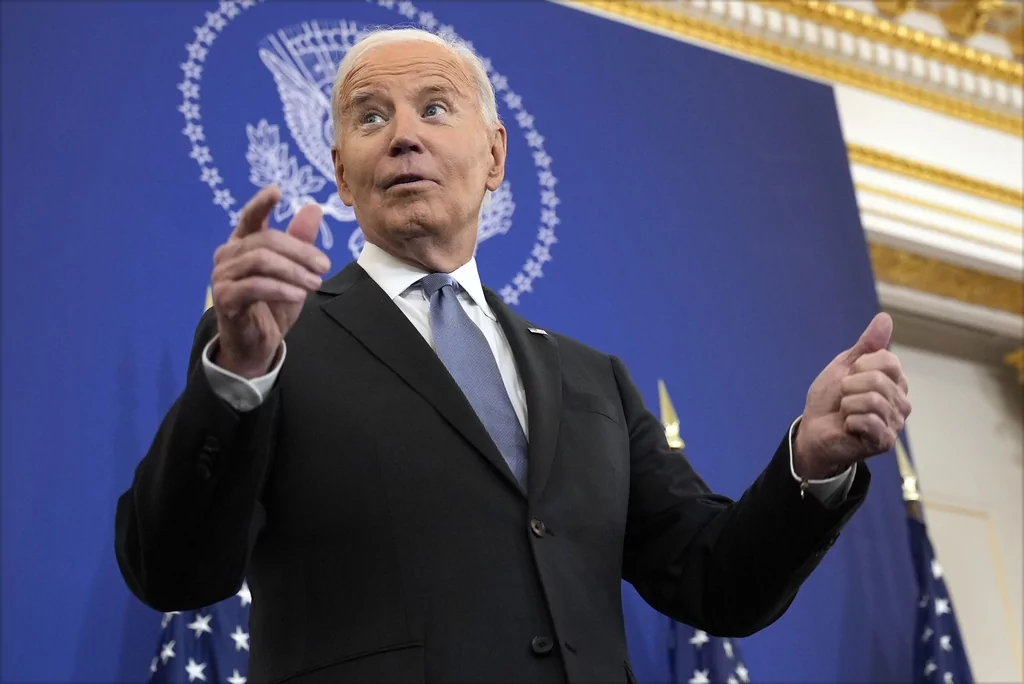
Biden’s speech was an epilogue to his four years of foreign policy work. His presidential term was marked by widespread instability in U.S. spheres of influence as the administration sought to extinguish fires in multiple geopolitical theaters, ranging from East Asia to the Middle East.
The president’s handling of foreign affairs started in disaster with the botched withdrawal of U.S. forces from Afghanistan in August 2021.
An operation intended to be a relief to the U.S. public, at last pulling the remaining U.S. servicemen from the volatile Middle Eastern nation, became a final humiliation that saw the 13 service members killed in a terrorist attack, allies left behind, and the reclamation of the country by the Taliban.
Biden said he “saw no reason to keep thousands of servicemen in Afghanistan” after determining that the “ongoing threat of al Qaeda will not be emanating from Afghanistan.”
The disastrous withdrawal killed the Biden administration’s momentum with the U.S. public in his first year, and his approval ratings were never the same. However, the international climate continued to deteriorate throughout his term.
Russia launched a full-scale invasion of Ukraine in February of the next year.
Russian President Vladimir Putin has been silent on what geopolitical developments drove him to initiate the historic conflict when he did, but Biden’s inability to curb the dictator’s plans has become a cudgel wielded liberally by his critics.
Biden pushed back against those who blame weak U.S. leadership for giving Russia the confidence to attack, bragging that he was able to stand in the Ukrainian capital amid the chaos while Putin was not.
“When Putin invaded Ukraine, he thought he’d conquer Kyiv in a matter of days. The truth is, since that war began, I’m the only one who stood in the center of Kyiv, not him. Putin never has. Think about it,” Biden told the State Department employees. “It was a long train ride, but I’m the only commander in chief who’s stood in a war zone not controlled by U.S. forces.”
The invasion was further complicated by the introduction of North Korean troops aiding Russia in the Kursk region — an unprecedented entry of the Korean People’s Army into the Eastern European theater.
North Korean Supreme Leader Kim Jong Un has taken a more belligerent stand in world politics during the Biden administration, abandoning its Trump-era defensive posture in favor of active cooperation with its few allies.
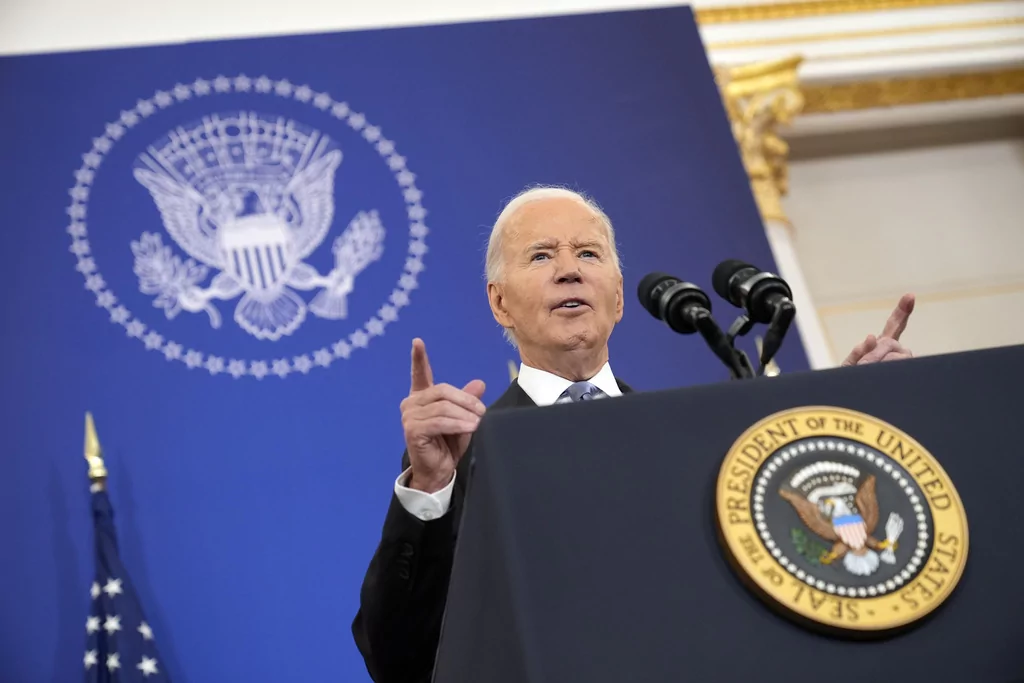
Biden touted his munition shipments, sanctions, and economic support that have kept Ukraine competitive against the far greater invading force. He urged the incoming Trump administration to continue the fight against Russian forces.
“Today, Ukraine is still a free, independent country with the potential — the potential — for a bright future,” Biden said. “We laid the foundation for the next administration so they can protect the bright future for the Ukrainian people.”
In his speech, the president declared that the “post-Cold-War era is over,” acknowledging that anti-Western powers are forming power blocs across the globe but saying this is “more out of weakness than out of strength.”
“Our alliances are stronger than they have been in decades,” Biden said. “NATO is more capable than it’s ever been.”
On Oct. 7, 2023, the Biden administration witnessed yet another foreign crisis emerge as an organized mob of Hamas affiliates stormed Israeli border regions and massacred over 1,200 people.
This attack kickstarted a military engagement between the Israel Defense Forces and Hamas, resulting in a bloody conflict and hundreds of hostages killed. Some Israelis still remain in Hamas custody, but their status and health are unknown.
The Hamas-affiliated Gaza Ministry of Health reported 46,584 people killed in Gaza and 100,000 people wounded.
Iran, which launched ballistic assaults on Israel multiple times, also fought proxy wars with the IDF through its affiliate terrorist groups in the surrounding region. This resulted in a total Israeli victory on all fronts and the virtual elimination of Hezbollah’s leadership in Lebanon.
“Now, Iran’s economy is in desperate straits. All told, Iran is weaker than it’s been in decades,” Biden said Monday.
Biden once again assured the public that his administration was “on the brink” of establishing peace between Israel and Hamas. It’s a promise that has been made and broken several times since the war first broke out in 2023, and few expect negotiations to accomplish anything in the final week and a half of his presidency.
At the end of last year, Biden’s administration saw its final foreign policy crisis with the collapse of Syria.
In December 2024, rebels led by the terrorist group Hayat Tahrir al Sham overthrew the regime headed by former Syrian President Bashar Assad.
The U.S. has a long, complicated history with the Assad regime. On one hand, the dictator repeatedly used chemical weapons and violent persecution to attack his administration’s enemies, and on the other, his government was committed to the protection of religious and ethnic minorities.
Ahmad al Sharaa, the leader of HTS and the de facto head of Syria’s acting government, has made overtures to transform the country into a secular, human-rights based nation. However, he has also warned that a functioning government with a ratified constitution could take years to create.
Biden urged the incoming president to “capitalize on a new moment for a more stable, integrated Middle East,” warning that “to do that, the next administration must make sure that the fall of Assad does not lead to the resurgence of ISIS in Syria and across the region.”
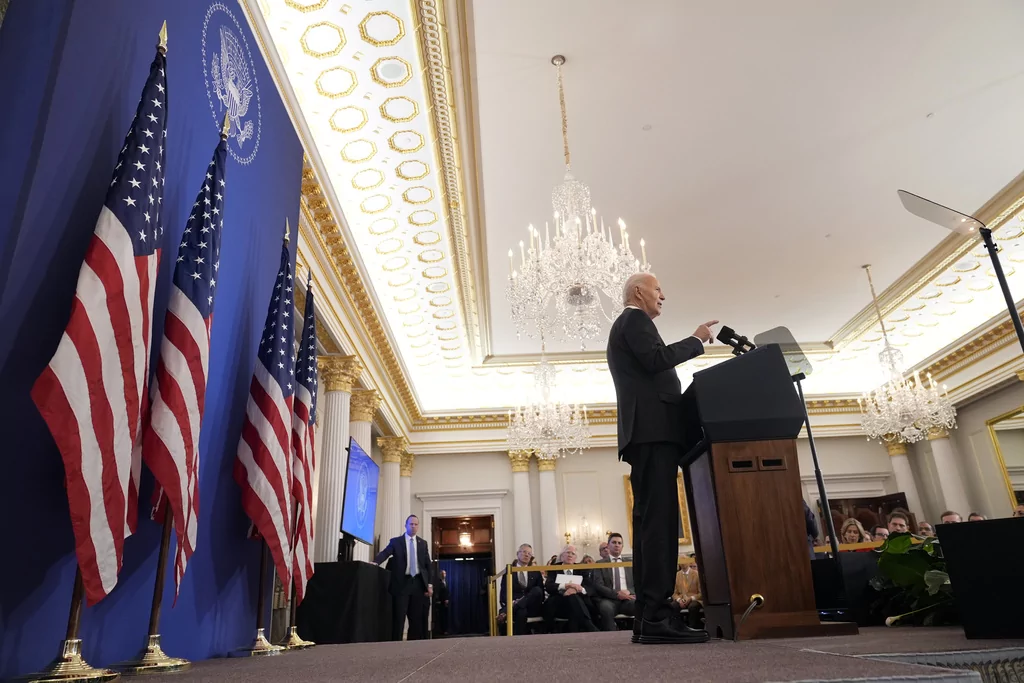
China remains the most prominent long-term threat to U.S. hegemony abroad, the president told the audience — a point of agreement with many in Trump’s circle.
“Even while we compete vigorously, we’ve managed our relationship with China responsibly, so it’s never tipped over into conflict,” Biden said at the State Department, adding that the two nations have “found ways to work with each other.”
The White House said Friday that foreign policy “has been a key pillar of who [Biden] is” and that the speech was intended to give “some thoughts on the future, not just of the country, but how this country moves forward as a leader.”
The president’s speech, which touched on every major conflict and diplomatic dispute facing the U.S., championed his administration, assuring the public that “our sources of national power are far stronger than they were when we took office.”
Trump is expected to introduce a slew of foreign policy initiatives on Day One of his presidency, with key goals including the end of hostilities in Ukraine, the release of hostages in Gaza, and renegotiated trade terms with China.
CLICK HERE TO READ MORE FROM THE WASHINGTON EXAMINER
The Trump administration has kept its strategies close to its chest, but the president-elect has repeatedly vowed to bring swift peace to Ukraine and Gaza.
Trump has fluctuated between calling world leaders such as Putin, Kim, and Chinese President Xi Jinping his “friends” and promising to play hardball to force anti-U.S. powers to cease operations that counter U.S. interests.



